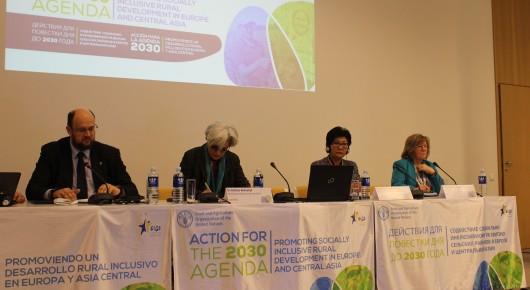Challenge: how to make sure rural women benefit from economic growth?

It has been almost 17 months since the nations of the world adopted the 2030 Agenda for Sustainable Development with its 17 Sustainable Development Goals. To keep up the momentum and start delivering measurable results, FAO is dedicating a three-day conference to the specific area of gender equality. The meeting opens today in Vilnius.
“The principle of ‘’Leaving no one behind’ guides every goal of the 2030 Agenda,” said Cristina Amaral, FAO deputy regional representative for Europe and Central Asia, in her welcoming remarks. “The focus on gender equality and women’s empowerment is explicit across all the Sustainable Development Goals, both as stand-alone Goal 5 and as a cross-cutting theme of more than 30 related targets.”
Entitled Promoting socially inclusive rural development in Europe and Central Asia, the conference is hosted by the European Institute for Gender Equality (EIGE), an autonomous body of the European Union on gender, based in Vilnius.
On the conference’s first day, statements by Ministers and other high-level participants lay the policy foundations for gender equality, presenting practical examples, local and international experiences, and success stories. Government representatives from European Union member countries, the Caucasus and Central Asia will be given the floor.
Women play a robust part in agriculture and food security: their labour force participation rate in the sector is 43 percent. Still, rural women are at greater risk of poverty. In almost all countries, female household heads have less access to critical resources such as land, water and credit, and are less well educated than their male counterparts.
Studies have shown that improved societal status of women counted for as much as half of the global reduction in hunger between 1970 and 1995. Progress in women's access to education alone was linked to a 43 percent gain in food security – as significant as the gains from increased food availability (26 percent) and health advances (19 percent) combined.
“When women have equal access to resources, they spend more than men do on food, health, clothing and education for their children,” said Dono Abdurazakova, FAO senior gender and social protection expert.
”Enabling and empowering rural women is essential for sustainable agricultural development and food security, and it can shift dynamics in the family, community and even globally for the better,” she said. “This means it can ensure long-term social and economic growth.”
Discussions will continue for through Wednesday, with country representatives and experts working in groups to detect challenges and opportunities, and to find tools and approaches for promoting inclusive agricultural and development policies. Finally, the conference is expected to present a “road map” with a path towards achieving this goal at both national and regional levels.
30 January 2017, Vilnius, Lithuania
